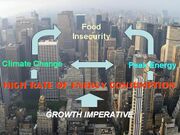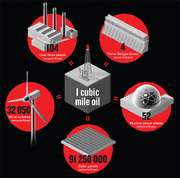Peak Energy[]
The subject of peak energy is even more controversial than climate change, although it does not receive the same attention in the media as the latter. Nor does it seem to resonate with electorates worldwide that we have any kind of energy at all except for the periodic distribution system failures that occur as happened in the blackout of August 2003.
Speaking recently to The Independent, Dr Fatih Birol, the chief economist at the respected and conservative International Energy Agency (IEA) in Paris, "One day we will run out of oil, it is not today or tomorrow, but one day we will run out of oil and we have to leave oil before oil leaves us, and we have to prepare ourselves for that day," Dr Birol said. "The earlier we start, the better, because all of our economic and social system is based on oil, so to change from that will take a lot of time and a lot of money and we should take this issue very seriously," he said.
The idea of peak energy stems from the considerable likelihood that large and rapid energy price increases will become sustained over time. They would be due principally to two factors:
- the steady and relentless growth of global energy demand as a consequence of the increasing prosperity of developing nations like China, India, Brazil, and Russia, and
- the inability to meet that energy demand by all the means available to humanity at a price consistent with our traditional use of low cost energy, particularly in the form of oil and natural gas.
Humanity is not running out of energy. There are many sources of energy we can possibly utilize, including :
- Various forms of oil (including light and heavy oils, as well as oil from tar sands and oil shales)
- Natural gas
- Coal based fuels (including syngas, synfuel and other coal liquefication products)
- Nuclear power
- Biofuels (including ethanol, biogas, and waste gas)
- Hydroelectricity (including small and micro hydro projects)
- Geothermal
- Solar power
- Wind power
- Tidal power
- Methane gas (including biomass production and deep ocean hydrates)

Each of these sources of energy delivers different amounts of energy at different costs. For instance, the graph on the left compares the energy 'profit' of various hydrocarbon fuels after their extraction and delivery.
A lot of attention has focused on oil because it delivers a lot of energy for a fraction of the costs of other types of energy. In fact it has been argued that oil (and its low cost) has been the primary development factor in the latter stages of the industrial revolution and the establishment of the high standard of living achieved in the world's developed countries such as Canada. Oil's mobility, versatility, and high energy density make it the fuel of choice. As a finite resource this leads to the idea of peak oil.
The problem with oil is that we've tapped all the easy to access sources of oil, such as the Texas, Alberta and Saudi oilfields and oil is becoming harder and harder to get at. Since the mid 1960s the volume of new oil being discovered has been declining and what is being found is becoming more costly in terms of money and energy to extract. Most oil producing countries have already maximized the amount of oil they can produce in a given year, as it gets harder to extract their remaining oil reserves. This is where the concept of peak oil comes in. Peak oil is often confused with oil depletion; peak oil is the point of maximum production while depletion refers to a period of falling reserves and supply.

As global demand continues to grow, it is becoming increasing difficult to provide the amount of oil people want at the low prices they have been used to paying. Supply and demand economics requires that the price of oil increases as demand increases if supply is fixed. As geologist David Hughes suggests, the problem is not the lack of resources but their deliverability -- how fast can these resources be converted into usable energy at costs we are willing to afford. Thus the deliverability risk of cheap energy can put economies at risk, and even our food supply. The choices we will make to mitigate this risk may further exacerbate the impact of climate change.
Some suggest that as oil becomes more expensive and less accessible, it will be replaced by alternatives just as natural gas, once considered a waste product of oil production, has already replaced oil in many areas. As market forces operate, oil will be replaced with coal or coal derivatives, or the most costly but greener sources of solar or wind power. It has also been suggested that nuclear power is likely to experience a renaissance as the reduced carbon footprint of electricity produced from nuclear fission becomes more acceptable.
However, the volumes of energy involved with the use of oil are gargantuan. One estimate in 2007 put the world's annual use of oil at approximately one cubic mile, or 26.86 billion barrels (Gb). Energy wise that's the equivalent of each of the following operating for 50 years:

- 104 coal fired power plants
- 52 nuclear powered plants
- 91,250,000 solar panels
- 4 Three Gorges Dams
- 32,850 wind turbines
The scale of the world's dependency on oil is hard to imagine. It is further complicated by the fact that oil can be used in so many different ways. It can be used to power transportation vehicles, provide heating, generate electricity, help produce fertilizers and plastics, and produce petrochemicals, pharmaceuticals and other chemical products. Given these multiple uses and the finite nature of our oil resources, burning oil for heat, transportation or the production of electricity is not the best use of this valuable commodity nor does it reflect proper stewardship towards future generations.
Hughes argues that while technologies may well come along to make oil extraction easier or make green energy production more efficient, but it is the time lag between now and then that could have disastrous consequences for the global economy.
thumb|300px|left Some like Jeff Rubin, the former Chief Economist at the CIBC, suggest that the current recession may be as much the result of the temporary spike in oil prices in the middle of 2008 as it was from the US mortgage debacle and an over stretched financial system. He says it is completely consistent with previous oil-related recessions. If we can't find the energy we need to grow at the low price we depend on, then the economy contracts and that puts pressure on a banking system that depends on constant economic expansion.
Combining Hughes' concern for our capacity to deliver the energy supplies we have to those who require it and Rubin's concern for the impact of higher energy prices on a growth based economy suggests that in the short term we could soon be experiencing energy scarcities because of an inability to invest adequately in the alternatives. Given the huge debts that most governments have acquired recently to mitigate the effects of this current recession, there is unlikely to be much slack available to address any new energy driven slow down.